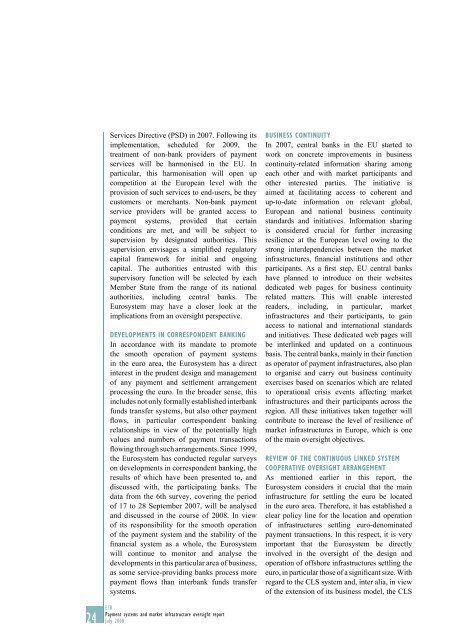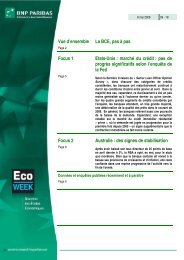Payment systems and market infrastructure oversight ... - Maths-fi.com
Payment systems and market infrastructure oversight ... - Maths-fi.com
Payment systems and market infrastructure oversight ... - Maths-fi.com
You also want an ePaper? Increase the reach of your titles
YUMPU automatically turns print PDFs into web optimized ePapers that Google loves.
Services Directive (PSD) in 2007. Following its<br />
implementation, scheduled for 2009, the<br />
treatment of non-bank providers of payment<br />
services will be harmonised in the EU. In<br />
particular, this harmonisation will open up<br />
<strong>com</strong>petition at the European level with the<br />
provision of such services to end-users, be they<br />
customers or merchants. Non-bank payment<br />
service providers will be granted access to<br />
payment <strong>systems</strong>, provided that certain<br />
conditions are met, <strong>and</strong> will be subject to<br />
supervision by designated authorities. This<br />
supervision envisages a simpli<strong>fi</strong>ed regulatory<br />
capital framework for initial <strong>and</strong> ongoing<br />
capital. The authorities entrusted with this<br />
supervisory function will be selected by each<br />
Member State from the range of its national<br />
authorities, including central banks. The<br />
Eurosystem may have a closer look at the<br />
implications from an <strong>oversight</strong> perspective.<br />
DEVELOPMENTS IN CORRESPONDENT BANKING<br />
In accordance with its m<strong>and</strong>ate to promote<br />
the smooth operation of payment <strong>systems</strong><br />
in the euro area, the Eurosystem has a direct<br />
interest in the prudent design <strong>and</strong> management<br />
of any payment <strong>and</strong> settlement arrangement<br />
processing the euro. In the broader sense, this<br />
includes not only formally established interbank<br />
funds transfer <strong>systems</strong>, but also other payment<br />
flows, in particular correspondent banking<br />
relationships in view of the potentially high<br />
values <strong>and</strong> numbers of payment transactions<br />
flowing through such arrangements. Since 1999,<br />
the Eurosystem has conducted regular surveys<br />
on developments in correspondent banking, the<br />
results of which have been presented to, <strong>and</strong><br />
discussed with, the participating banks. The<br />
data from the 6th survey, covering the period<br />
of 17 to 28 September 2007, will be analysed<br />
<strong>and</strong> discussed in the course of 2008. In view<br />
of its responsibility for the smooth operation<br />
of the payment system <strong>and</strong> the stability of the<br />
<strong>fi</strong>nancial system as a whole, the Eurosystem<br />
will continue to monitor <strong>and</strong> analyse the<br />
developments in this particular area of business,<br />
as some service-providing banks process more<br />
payment flows than interbank funds transfer<br />
<strong>systems</strong>.<br />
BUSINESS CONTINUITY<br />
In 2007, central banks in the EU started to<br />
work on concrete improvements in business<br />
continuity-related information sharing among<br />
each other <strong>and</strong> with <strong>market</strong> participants <strong>and</strong><br />
other interested parties. The initiative is<br />
aimed at facilitating access to coherent <strong>and</strong><br />
up-to-date information on relevant global,<br />
European <strong>and</strong> national business continuity<br />
st<strong>and</strong>ards <strong>and</strong> initiatives. Information sharing<br />
is considered crucial for further increasing<br />
resilience at the European level owing to the<br />
strong interdependencies between the <strong>market</strong><br />
<strong>infrastructure</strong>s, <strong>fi</strong>nancial institutions <strong>and</strong> other<br />
participants. As a <strong>fi</strong>rst step, EU central banks<br />
have planned to introduce on their websites<br />
dedicated web pages for business continuity<br />
related matters. This will enable interested<br />
readers, including, in particular, <strong>market</strong><br />
<strong>infrastructure</strong>s <strong>and</strong> their participants, to gain<br />
access to national <strong>and</strong> international st<strong>and</strong>ards<br />
<strong>and</strong> initiatives. These dedicated web pages will<br />
be interlinked <strong>and</strong> updated on a continuous<br />
basis. The central banks, mainly in their function<br />
as operator of payment <strong>infrastructure</strong>s, also plan<br />
to organise <strong>and</strong> carry out business continuity<br />
exercises based on scenarios which are related<br />
to operational crisis events affecting <strong>market</strong><br />
<strong>infrastructure</strong>s <strong>and</strong> their participants across the<br />
region. All these initiatives taken together will<br />
contribute to increase the level of resilience of<br />
<strong>market</strong> <strong>infrastructure</strong>s in Europe, which is one<br />
of the main <strong>oversight</strong> objectives.<br />
REVIEW OF THE CONTINUOUS LINKED SYSTEM<br />
COOPERATIVE OVERSIGHT ARRANGEMENT<br />
As mentioned earlier in this report, the<br />
Eurosystem considers it crucial that the main<br />
<strong>infrastructure</strong> for settling the euro be located<br />
in the euro area. Therefore, it has established a<br />
clear policy line for the location <strong>and</strong> operation<br />
of <strong>infrastructure</strong>s settling euro-denominated<br />
payment transactions. In this respect, it is very<br />
important that the Eurosystem be directly<br />
involved in the <strong>oversight</strong> of the design <strong>and</strong><br />
operation of offshore <strong>infrastructure</strong>s settling the<br />
euro, in particular those of a signi<strong>fi</strong>cant size. With<br />
regard to the CLS system <strong>and</strong>, inter alia, in view<br />
of the extension of its business model, the CLS<br />
ECB<br />
<strong>Payment</strong> <strong>systems</strong> <strong>and</strong> <strong>market</strong> <strong>infrastructure</strong> <strong>oversight</strong> report<br />
24 July 2008

















